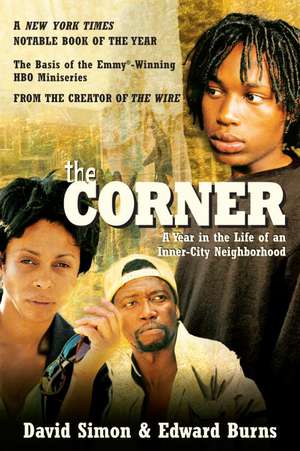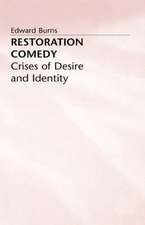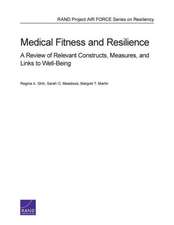The Corner: A Year in the Life of an Inner-City Neighborhood
Autor David Simon, Edward Burnsen Limba Engleză Paperback – 31 mai 1998
Through the eyes of one broken family--two drug-addicted adults and their smart, vulnerable 15-year-old son, DeAndre McCollough, Simon and Burns examine the sinister realities of inner cities across the country and unflinchingly assess why law enforcement policies, moral crusades, and the welfare system have accomplished so little. This extraordinary book is a crucial look at the price of the drug culture and the poignant scenes of hope, caring, and love that astonishingly rise in the midst of a place America has abandoned.
| Toate formatele și edițiile | Preț | Express |
|---|---|---|
| Paperback (2) | 84.38 lei 22-36 zile | +18.36 lei 6-12 zile |
| Canongate Books – 5 oct 2022 | 84.38 lei 22-36 zile | +18.36 lei 6-12 zile |
| BROADWAY BOOKS – 31 mai 1998 | 115.50 lei 22-36 zile |
Preț: 115.50 lei
Nou
Puncte Express: 173
Preț estimativ în valută:
22.11€ • 24.02$ • 18.58£
22.11€ • 24.02$ • 18.58£
Carte disponibilă
Livrare economică 31 martie-14 aprilie
Preluare comenzi: 021 569.72.76
Specificații
ISBN-13: 9780767900317
ISBN-10: 0767900316
Pagini: 576
Dimensiuni: 140 x 208 x 33 mm
Greutate: 0.45 kg
Ediția:Trade Pbk.
Editura: BROADWAY BOOKS
ISBN-10: 0767900316
Pagini: 576
Dimensiuni: 140 x 208 x 33 mm
Greutate: 0.45 kg
Ediția:Trade Pbk.
Editura: BROADWAY BOOKS
Notă biografică
David Simon is the author of the bestselling Homicide: A Year on the Killing Streets, which won an Edgar Award and inspired Barry Levinson's Emmy Award-winning television program of the same name. A freelance writer based in Baltimore, he is also a writer and producer for Homicide and received the 1994 Writer's Guild for America Award for outstanding script in an episodic television drama.
A teacher in the Baltimore public school system, Edward Burns retired after serving twenty years in the city police department. For much of that time, he worked as a detective in the homicide unit.
A teacher in the Baltimore public school system, Edward Burns retired after serving twenty years in the city police department. For much of that time, he worked as a detective in the homicide unit.
Extras
Gary McCullough nods, flustered, looking out at the Wabash Avenue courtroom for some better truth, or some better way of telling it. From the middle of the third bench, his mother covers her frown with both hands, terrified at the image of her son's life hanging in the balance. Gary catches her eye and tries to smile, then loses his train of thought.
"It's like . . . judge, please, this is just crazy."
Judge Bass, sensing the panic, tries to put the defendant at ease. "Take your time, Mr. McCullough, I'm listening to you. I just need you to speak louder."
"Okay."
"Go ahead."
"All right."
Where to begin? What to say? What to leave unsaid? So much to worry about now that all that foolishness with Ronnie is getting its day in court. Gary has taken a charge behind this nonsense; he's seen the bullpen on Eager Street because of it. And now, when he should be speaking up for himself and putting it all to rest, he's a stammering wreck. It's hell getting the God's honest truth out of your mouth when the damn thing is wrapped up in lies.
"We had an argument . . . ," says Gary.
True enough.
". . . about some money."
Lie.
"An' Ronnie, I mean, Veronica began yelling."
True again.
"So I asked her to leave . . ."
Still true.
". . . but she kept cussin' me and telling me she wasn't going to go without the, ah, the, um . . . the money."
The lie again.
"Mr. McCullough, you'll have to speak up."
"Um . . ."
"You'll have to talk louder so I can hear you."
Gary nods, agreeable. "She just wouldn't leave," he tells Judge Bass, "so I finally shoved her a little, toward the door, like. I didn't hit her, I just pushed her to get her out of the house."
Truth, or close enough to it.
"And she threw a brick at me . . ."
Truth.
"A brick?" asks Judge Bass.
"And a knife," adds Gary.
Lie. A home run swing from Gary McCullough.
"She threw a knife at you?"
"I was standing in the doorway."
"What kind of knife?"
"Kitchen kind. Had a big blade and all."
The judge can't let that one go. He's looking up at the acoustic-tile ceiling, giving words to the thought running through the heads of everyone else in the courtroom.
"Where did she get the knife?"
Gary shrugs, wondering what that has to do with anything. He's sweating profusely, a prisoner inside his gray pinstripe church suit.
"I mean," says the judge. "Did she have the knife on her or did she go and get the knife from somewhere? She didn't just find it lying in the street, did she?"
Gary shrugs again, then scratches his ear, thinking about it. To look at him, to catch even a glimpse of the sincerity in his face, you'd think there might actually have been a knife involved. Who's to say? With Gary McCullough, a man far too honest about most things, the occasional lie always takes on a life of its own. Today, on a bright May morning, eight months after the fact, he truly believes Ronnie tossed a knife at him. If she had a knife, she surely would have.
Judge Bass raises an eyebrow, then glances over at the assistant state's attorney, who lets the judge continue the redirect. "Do you know where the knife came from?" the judge asks Gary.
"From Ronnie's hand. She threw it."
Laughter breaks from the clustered humanity on the court benches. Even Judge Bass has to smile.
"But you don't know where she got it."
"Uh-uh."
"Okay, go on."
Go on, Mr. McCullough. Tell the tale as best you can. But leave out the part about the vials of heroin, the part where you wouldn't share a blast with Ronnie and she started to raise hell, calling you all kinds of names. By all means, mention the brick--the kitchen knife, even--but leave out the part where you ran out of the house afterward to confront her, grabbing her neck, and then shoving her down the sidewalk. Tell it in small pieces, as if it's a broken puzzle. Tell it the way you think they might want to hear it.
"I didn't hit her," Gary says.
That this case is now being played out in court is, in itself, an incredible thing. That it couldn't be stetted or nol-prossed or reduced to some unsupervised probation is testament only to the current political imperatives. Gary and Ronnie both had come to court today certain that they could make the thing go away; Ronnie would decline to testify and the prosecutors would shrug and toss the casefile into a tall stack of district court dismissals.
But no. It wasn't just the usual Western District prosecutor in court today, but an assistant state's attorney from downtown somewhere. And this case could not be dismissed as everyone desired because of its status as a domestic violence complaint. In the eyes of the government, Ronnie Boice is no longer the quick-thinking, game-running, syringe-switching wonder of Fayette Street. Consciousness has been sufficiently raised so that now, by a policy new to the prosecutor's office, all domestic assault cases are fully pursued--even when a wife or girlfriend has attempted to back away from her original statement. For today at least, Ronnie Boice will be representing battered womanhood.
It's a noble effort by the state's attorney's office, a worthy strategy in those cases in which abused women are too frightened or intimidated to testify against their assailants. In the present case, however, the new policy is a source of unintentional hilarity.
Ronnie never had any intention of pursuing the case; she just wanted Gary to know that what was his--coke, dope, or both--was hers as well. But now she'll have to testify or risk being charged with obstructing justice. And if she tells the truth on the stand--tells them that it was a shoving match over a blast--well, that will mean a charge of false statement or perjury for her original complaint. When Gary declined a plea offer of six months in jail followed by spousal abuse counseling, the court trial was the only option left.
"Why would Miss Boice make a complaint against you if you didn't hit her?" asks the prosecutor, picking up the redirect.
"I don't know," says Gary, looking genuinely hurt.
"But you're saying she made all this up?"
"Yes."
"Why would she do that?"
Gary's mouth gapes open, then shuts. He wants to say it. He has to fight himself not to say it: Why do you think, fool? She wanted my blast. She wanted my blast and I said no and so she called the police. If Gary told them that, if he let it fall from his lips in the Western District court, everything would make sense. And neither the judge nor the prosecutor would bother to bring any charge from the admission of drug use, not in Baltimore, anyway. But Gary can't see that; he keeps his secret.
Ronnie, too. Just before Gary took the witness stand in his own defense, Ronnie gave her own grudging testimony. Questioned by the prosecutor, she made no mention of the blast, choosing instead to pretend that the argument was about Gary giving his attentions to some other girl. In sharp contrast to Gary's later panic, his girl managed to thread the needle masterfully. Droll from the witness stand, her eyes bouncing between Gary at the defense table and his mother three rows back, she destroyed the case without directly contradicting her original complaint. No, she did not throw a brick. No, there was no knife. Yes, Gary did shove her, and later, on the sidewalk, he slapped her. But yeah, well, she did push him, too. In fact, she might have pushed him first, now that she thinks on it.
"Mutual combat," said Judge Bass, looking at the state's attorney in bland resignation. Once Ronnie left the witness stand, it only remained for Gary to make some kind of denial and now, testifying in his own defense, he manages that much.
"Your honor. I didn't hit her. I swear."
Not guilty. The Western District prosecutor nods agreeably, then tosses the file into the discard pile. The domestic violence specialist from downtown looks crestfallen.
Out in the courthouse hallway, the victory celebration is brief and ugly. Gary walks out with his mother on his arm; Ronnie, right behind him, with her own mother, who apparently didn't want to miss her daughter's big day in court.
"Well," ventures Roberta McCullough, "at least that's over."
"Over and done with," agrees Miss Sarah.
"But I don't think our childrens should be together," Miss Roberta says, eyeing Ronnie fretfully. "They're just not good for each other. They don't do each other any good."
Ronnie's mother bristles. "What the hell you mean by that?"
Hands braced against her hips, she stares down at the smaller woman with contempt. Gary is behind his mother, looking at Ronnie in horror. Ronnie is smiling.
"I just mean . . ."
"They'se grown-up children," shouts Miss Sarah, performing for the entire building. "You can't tell them what to do, you ol' bitch cow."
Roberta McCullough's small frame seems to warp from the verbal assault, her eyes falling to the floor. Shaking, she holds one hand to her heart; Gary takes the other and tries to lead her to the stairs.
"Who the hell you think you is?" shouts Ronnie's mother. "Tell my daughter what she can and can't do. You can go an' fuck yo'self, you ol' cow."
From the top of the stairs, Gary helps his stricken mother to the rail, then looks back over his shoulder to see Ronnie and her mother following. Miss Sarah keeps bellowing insults; Ronnie is behind her, smiling so wickedly that Gary realizes that this is part of the price, that Ronnie--having known that his mother would be there for him--had contrived to bring her own mother to the show.
"You think you so high and mighty," yells Miss Sarah. "Your son ain't no better than my daughter."
The words echo down the stairs. Without turning, Miss Roberta falls back on the grace that she knows: "I'll pray for you," she tells her adversary. "That's all I can do."
"Don't need your got-damn prayers, bitch."
They leave the courthouse separately: Gary, consoling his mother, promising to have nothing more to do with Ronnie or her family; Ronnie, heading to Lafayette Market with the matriarch of the Boice clan, the two of them reliving the hallway battle in all its detail.
The episode is enough to keep Gary from Ronnie all that night and the next day. He runs the streets telling himself that nothing--no caper, no blast, no game--will be enough to subject his mother to anything like that again. And it is true that Gary loathes nothing so much as the idea that his life is bringing grief to his mother.
"It's like . . . judge, please, this is just crazy."
Judge Bass, sensing the panic, tries to put the defendant at ease. "Take your time, Mr. McCullough, I'm listening to you. I just need you to speak louder."
"Okay."
"Go ahead."
"All right."
Where to begin? What to say? What to leave unsaid? So much to worry about now that all that foolishness with Ronnie is getting its day in court. Gary has taken a charge behind this nonsense; he's seen the bullpen on Eager Street because of it. And now, when he should be speaking up for himself and putting it all to rest, he's a stammering wreck. It's hell getting the God's honest truth out of your mouth when the damn thing is wrapped up in lies.
"We had an argument . . . ," says Gary.
True enough.
". . . about some money."
Lie.
"An' Ronnie, I mean, Veronica began yelling."
True again.
"So I asked her to leave . . ."
Still true.
". . . but she kept cussin' me and telling me she wasn't going to go without the, ah, the, um . . . the money."
The lie again.
"Mr. McCullough, you'll have to speak up."
"Um . . ."
"You'll have to talk louder so I can hear you."
Gary nods, agreeable. "She just wouldn't leave," he tells Judge Bass, "so I finally shoved her a little, toward the door, like. I didn't hit her, I just pushed her to get her out of the house."
Truth, or close enough to it.
"And she threw a brick at me . . ."
Truth.
"A brick?" asks Judge Bass.
"And a knife," adds Gary.
Lie. A home run swing from Gary McCullough.
"She threw a knife at you?"
"I was standing in the doorway."
"What kind of knife?"
"Kitchen kind. Had a big blade and all."
The judge can't let that one go. He's looking up at the acoustic-tile ceiling, giving words to the thought running through the heads of everyone else in the courtroom.
"Where did she get the knife?"
Gary shrugs, wondering what that has to do with anything. He's sweating profusely, a prisoner inside his gray pinstripe church suit.
"I mean," says the judge. "Did she have the knife on her or did she go and get the knife from somewhere? She didn't just find it lying in the street, did she?"
Gary shrugs again, then scratches his ear, thinking about it. To look at him, to catch even a glimpse of the sincerity in his face, you'd think there might actually have been a knife involved. Who's to say? With Gary McCullough, a man far too honest about most things, the occasional lie always takes on a life of its own. Today, on a bright May morning, eight months after the fact, he truly believes Ronnie tossed a knife at him. If she had a knife, she surely would have.
Judge Bass raises an eyebrow, then glances over at the assistant state's attorney, who lets the judge continue the redirect. "Do you know where the knife came from?" the judge asks Gary.
"From Ronnie's hand. She threw it."
Laughter breaks from the clustered humanity on the court benches. Even Judge Bass has to smile.
"But you don't know where she got it."
"Uh-uh."
"Okay, go on."
Go on, Mr. McCullough. Tell the tale as best you can. But leave out the part about the vials of heroin, the part where you wouldn't share a blast with Ronnie and she started to raise hell, calling you all kinds of names. By all means, mention the brick--the kitchen knife, even--but leave out the part where you ran out of the house afterward to confront her, grabbing her neck, and then shoving her down the sidewalk. Tell it in small pieces, as if it's a broken puzzle. Tell it the way you think they might want to hear it.
"I didn't hit her," Gary says.
That this case is now being played out in court is, in itself, an incredible thing. That it couldn't be stetted or nol-prossed or reduced to some unsupervised probation is testament only to the current political imperatives. Gary and Ronnie both had come to court today certain that they could make the thing go away; Ronnie would decline to testify and the prosecutors would shrug and toss the casefile into a tall stack of district court dismissals.
But no. It wasn't just the usual Western District prosecutor in court today, but an assistant state's attorney from downtown somewhere. And this case could not be dismissed as everyone desired because of its status as a domestic violence complaint. In the eyes of the government, Ronnie Boice is no longer the quick-thinking, game-running, syringe-switching wonder of Fayette Street. Consciousness has been sufficiently raised so that now, by a policy new to the prosecutor's office, all domestic assault cases are fully pursued--even when a wife or girlfriend has attempted to back away from her original statement. For today at least, Ronnie Boice will be representing battered womanhood.
It's a noble effort by the state's attorney's office, a worthy strategy in those cases in which abused women are too frightened or intimidated to testify against their assailants. In the present case, however, the new policy is a source of unintentional hilarity.
Ronnie never had any intention of pursuing the case; she just wanted Gary to know that what was his--coke, dope, or both--was hers as well. But now she'll have to testify or risk being charged with obstructing justice. And if she tells the truth on the stand--tells them that it was a shoving match over a blast--well, that will mean a charge of false statement or perjury for her original complaint. When Gary declined a plea offer of six months in jail followed by spousal abuse counseling, the court trial was the only option left.
"Why would Miss Boice make a complaint against you if you didn't hit her?" asks the prosecutor, picking up the redirect.
"I don't know," says Gary, looking genuinely hurt.
"But you're saying she made all this up?"
"Yes."
"Why would she do that?"
Gary's mouth gapes open, then shuts. He wants to say it. He has to fight himself not to say it: Why do you think, fool? She wanted my blast. She wanted my blast and I said no and so she called the police. If Gary told them that, if he let it fall from his lips in the Western District court, everything would make sense. And neither the judge nor the prosecutor would bother to bring any charge from the admission of drug use, not in Baltimore, anyway. But Gary can't see that; he keeps his secret.
Ronnie, too. Just before Gary took the witness stand in his own defense, Ronnie gave her own grudging testimony. Questioned by the prosecutor, she made no mention of the blast, choosing instead to pretend that the argument was about Gary giving his attentions to some other girl. In sharp contrast to Gary's later panic, his girl managed to thread the needle masterfully. Droll from the witness stand, her eyes bouncing between Gary at the defense table and his mother three rows back, she destroyed the case without directly contradicting her original complaint. No, she did not throw a brick. No, there was no knife. Yes, Gary did shove her, and later, on the sidewalk, he slapped her. But yeah, well, she did push him, too. In fact, she might have pushed him first, now that she thinks on it.
"Mutual combat," said Judge Bass, looking at the state's attorney in bland resignation. Once Ronnie left the witness stand, it only remained for Gary to make some kind of denial and now, testifying in his own defense, he manages that much.
"Your honor. I didn't hit her. I swear."
Not guilty. The Western District prosecutor nods agreeably, then tosses the file into the discard pile. The domestic violence specialist from downtown looks crestfallen.
Out in the courthouse hallway, the victory celebration is brief and ugly. Gary walks out with his mother on his arm; Ronnie, right behind him, with her own mother, who apparently didn't want to miss her daughter's big day in court.
"Well," ventures Roberta McCullough, "at least that's over."
"Over and done with," agrees Miss Sarah.
"But I don't think our childrens should be together," Miss Roberta says, eyeing Ronnie fretfully. "They're just not good for each other. They don't do each other any good."
Ronnie's mother bristles. "What the hell you mean by that?"
Hands braced against her hips, she stares down at the smaller woman with contempt. Gary is behind his mother, looking at Ronnie in horror. Ronnie is smiling.
"I just mean . . ."
"They'se grown-up children," shouts Miss Sarah, performing for the entire building. "You can't tell them what to do, you ol' bitch cow."
Roberta McCullough's small frame seems to warp from the verbal assault, her eyes falling to the floor. Shaking, she holds one hand to her heart; Gary takes the other and tries to lead her to the stairs.
"Who the hell you think you is?" shouts Ronnie's mother. "Tell my daughter what she can and can't do. You can go an' fuck yo'self, you ol' cow."
From the top of the stairs, Gary helps his stricken mother to the rail, then looks back over his shoulder to see Ronnie and her mother following. Miss Sarah keeps bellowing insults; Ronnie is behind her, smiling so wickedly that Gary realizes that this is part of the price, that Ronnie--having known that his mother would be there for him--had contrived to bring her own mother to the show.
"You think you so high and mighty," yells Miss Sarah. "Your son ain't no better than my daughter."
The words echo down the stairs. Without turning, Miss Roberta falls back on the grace that she knows: "I'll pray for you," she tells her adversary. "That's all I can do."
"Don't need your got-damn prayers, bitch."
They leave the courthouse separately: Gary, consoling his mother, promising to have nothing more to do with Ronnie or her family; Ronnie, heading to Lafayette Market with the matriarch of the Boice clan, the two of them reliving the hallway battle in all its detail.
The episode is enough to keep Gary from Ronnie all that night and the next day. He runs the streets telling himself that nothing--no caper, no blast, no game--will be enough to subject his mother to anything like that again. And it is true that Gary loathes nothing so much as the idea that his life is bringing grief to his mother.
Recenzii
Praise for The Corner:
"The Corner is an intimate, intense dispatch from the broken heart of urban America. It is impossible to read these pages and not feel stunned at the high price, in human potential, in thwarted aspirations, that simple survival on the streets of West Baltimore demands of its citizens. An important document, as devastating as it is lucid."
--Richard Price, author of Clockers
"The Corner is a remarkable book--very tough, very demanding, very rewarding. Some of it is brutal and all of it is heartbreaking. As a reporter, I can only stand back and admire David Simon and Edward Burns for an amazing piece of reportage. To be there for an entire year, to make sense of random events and a list of characters long enough to make Charles Dickens envious, and to write coherently--it's a breathtaking achievement. And they manage to make West Baltimore as much a character as any of the flesh-and-blood people in the book."
--Glenn Frankel, author of Beyond the Promised Land
"If you want to understand street-corner life in the inner city, you should read The Corner, an amazingly intimate, detailed work of reporting that makes human and vivid a world that outsiders ordinarily are forced to learn about through statistics, sound bites, and stereotypes."
--Nicholas Lemann, author of The Promised Land
"The Corner is an intimate, intense dispatch from the broken heart of urban America. It is impossible to read these pages and not feel stunned at the high price, in human potential, in thwarted aspirations, that simple survival on the streets of West Baltimore demands of its citizens. An important document, as devastating as it is lucid."
--Richard Price, author of Clockers
"The Corner is a remarkable book--very tough, very demanding, very rewarding. Some of it is brutal and all of it is heartbreaking. As a reporter, I can only stand back and admire David Simon and Edward Burns for an amazing piece of reportage. To be there for an entire year, to make sense of random events and a list of characters long enough to make Charles Dickens envious, and to write coherently--it's a breathtaking achievement. And they manage to make West Baltimore as much a character as any of the flesh-and-blood people in the book."
--Glenn Frankel, author of Beyond the Promised Land
"If you want to understand street-corner life in the inner city, you should read The Corner, an amazingly intimate, detailed work of reporting that makes human and vivid a world that outsiders ordinarily are forced to learn about through statistics, sound bites, and stereotypes."
--Nicholas Lemann, author of The Promised Land
Descriere
From the prize-winning author of "Homicide" and a former police detective comes the searing true story of one of America's most crime-ridden neighborhoods, located in Baltimore, and a family struggling to survive there. of photos.
























